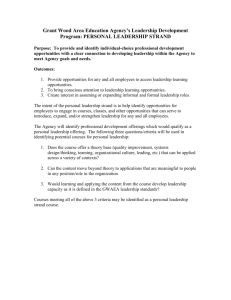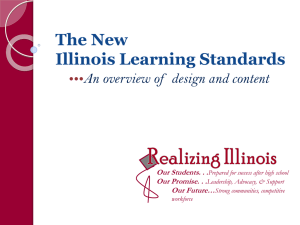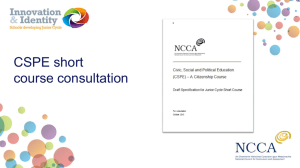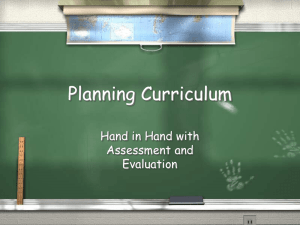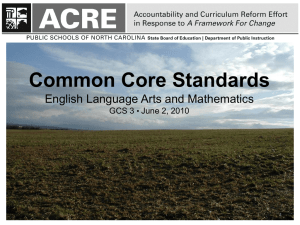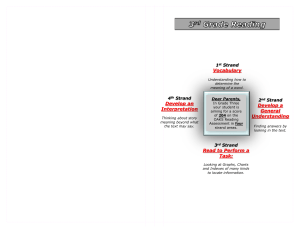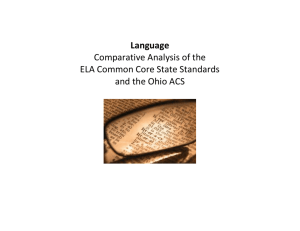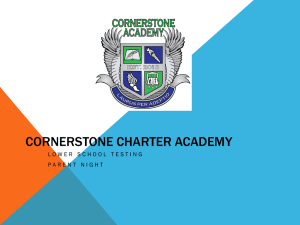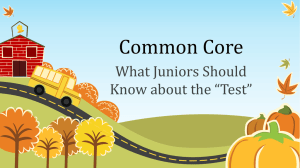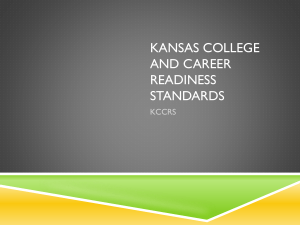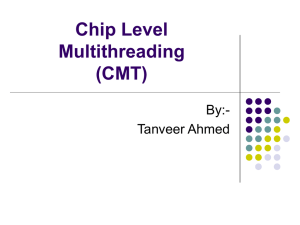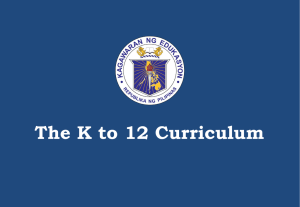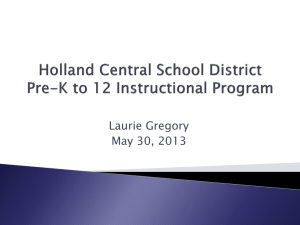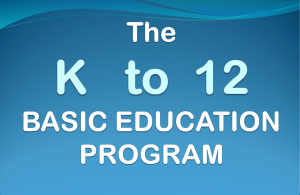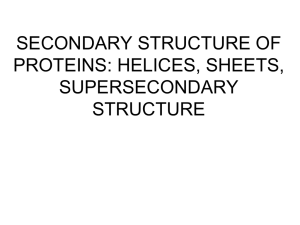Structure of ELA Standards PowerPoint
advertisement
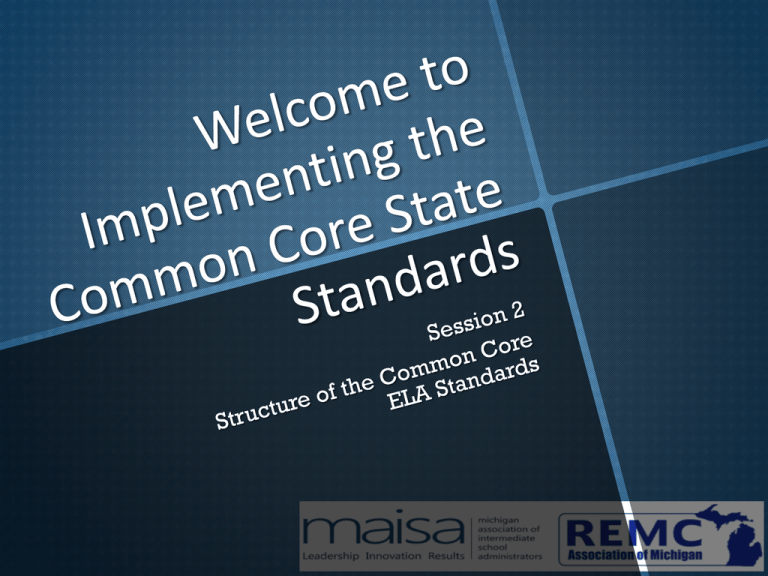
Outcomes for this Session Receive background knowledge about how the Common Core ELA Standards are structured Who is Responsible? Elementary teachers K-5 Science, Social Studies, & History teachers 6-12 Secondary ELA teachers 6-12 4 Foundational Reading Standard Skills (K-5) Print Concepts Strand (K-2) Phonological Awareness Strand (K-2) K-5 ELA Phonics and Word Recognition Strand www.corestandards.org Page 15 – 17 K-2 responsible for all 4 Areas Fluency Strand 4 Reading Standard Strands (K-12) Key Ideas and Details Strand (3 Standards) Integration of Knowledge and Ideas Strand (3 Standards) ELA for Literature, Informational- ELA Science, SS & History Craft and Structure Strand (3 Standards) Range and Level of Text Complexity Strand (1 Standard) 4 Writing Standard Strands (K-12) Text Types and Purposes Strand (3 Standards) Production and Distribution of Writing Strand ELA, Science, SS & History (3 Standards) Research to Build Knowledge Strand Range of Writing Strand (3 Standards) (1 Standard) 2 Language Standard Strands (K-12) Conventions in Writing and Speaking Strand Vocabulary Acquisition and Use Strand (3 Standards) (3 Standards) ELA 2 Speaking and Listening Standard Strands (K-12) Comprehension and Collaboration Strand Presentation of Knowledge and Ideas Strand (3 Standards) (3 Standards) ELA Reading Emphasis FROM www.corestandards.org Page 5 10 College and Career Readiness Anchor Standards for Reading (K-12) Key Ideas and Details See Standards Document K-5 Page 11 1. Read closely to determine what the text says explicitly and to make logical inferences from it; cite specific textural evidence when writing or speaking to support conclusions drawn from text. 6-8 Page 36 2. Determine central ideas or themes of a text and analyze their development; summarize the key supporting details and ideas. 9-12 Page 38 3. Analyze how and why individuals, events, and ideas develop and interact over the course of a text. Content Pages 6162 10 College and Career Readiness Anchor Standards for Reading (K-12) Craft and Structure See Standards Document K-5 Page 11 4. Interpret words and phrases as they are used in a text, including determining technical, connotative, and figurative meanings, and analyze how specific word choices shape meaning or tone. 6-8 Page 36 5. Analyze the structure of texts, including how specific sentences, paragraphs, and larger portions of the text (e.g., a section, chapter, scene, or stanza) relate to each other and the whole. 9-12 Page 38 6. Assess how point of view or purpose shapes the content and style Content Pages 61of a text. 62 10 College and Career Readiness Anchor Standards for Reading (K-12) Integration of Knowledge and Ideas 7. Integrate and evaluate content presented in diverse formats and media, including visually and quantitatively, as well as in words.1 8. Delineate and evaluate the argument and specific claims in a text, including the validity of the reasoning as well as the relevance and sufficiency of the evidence. 9. Analyze how two of more texts address similar themes or topics in order to build knowledge or to compare the approaches the authors take. See Standards Document K-5 Page 11 6-8 Page 36 9-12 Page 38 Content Pages 6162 10 College and Career Readiness Anchor Standards for Reading (K-12) Range and Level of Text Complexity See Standards Document K-5 Page 11 6-8 Page 36 10. Read and comprehend complex literary and informational texts independently and proficiently 9-12 Page 38 Content Pages 6162 Common Core Standards REVIEW THE STANDARDS FOR YOUR GRADE LEVEL (5 minutes) • What do you see? HIGHLIGHT GREEN • What do you notice? HIGHLIGHT YELLOW PARTNER WITH MEMBERS FROM 2 ADJACENT GRADE LEVELS (5 minutes) • What do you see between grade levels? HIGHLIGHT PINK • What do you notice about student readiness? HIGHLIGHT ORANGE The conversation is just beginning (5 minutes) – • WHERE DO WE BEGIN? • HOW DO WE ADJUST TO INSURE STUDENT SUCCESS? • HOW DO WE SUPPORT ONE ANOTHER? Benefits of the CCSS 17 Internationally benchmarked Expectations clear to students, parents, teachers, and the general public Allow for collaboration with other states on best practices, instructional materials, and professional development Costs to the state reduced Consistent expectations for all—not dependent on a zip code 17 Reflection More information and updates can be found for Common Core State Standards can be found on: MDE website: www.michigan.gov/mde Common Core State Standards: www.corestandards.org Smarter Balanced Consortia: www.k12.wa.us/smarter/ 19
